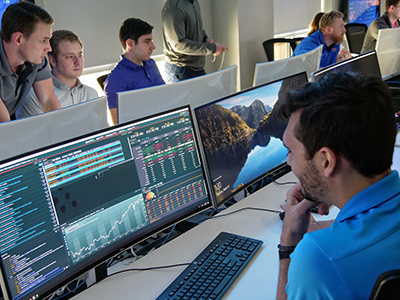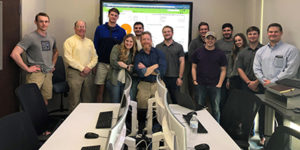NEWS
College of Business Makes $150,000 Investment from Student Managed Investment Fund


Students within the College of Business at Louisiana Tech University made the initial investment from the Student Managed Investment Fund (SMIF) on March 13. The class, led by Dr. Bill McCumber (center right), was joined by SMIF board member and president of Argent Institutional Services, Lucius McGehee (second from left).
“The SMIF is an opportunity that few people — even in the real world — would ever experience,” said JPJ Investments Endowed Professor of Finance Dr. Bill McCumber. “It benefits students by bridging the gap between theory and practice, allowing them to build and articulate demonstrable, professional, real-world experience.”
With $150,000 in the fund, the portfolio is governed by an advisory board comprised of industry professionals. Student managers will provide performance reports and make a formal presentation to the board each year. In addition to providing real-world experience for our students, the SMIF’s spending rule will provide the College of Business with funds for technology upgrades, student travel and other program enhancements.
“It was exhilarating investing the initial amount of money in the market,” said senior finance major Allison Powell, of Minden. “The money we invested this week is the beginning of investments that Louisiana Tech students will be making for years to come — it’s both humbling and exciting.”
The SMIF is an actively managed portfolio using Exchange Traded Funds (EFTs), wherein student managers decide which sectors, assets, and geographies are most promising. EFTs allow SMIF managers broad exposure to every asset class, commodity and currency, globally.
“These students are in a professional money management environment wherein they are doing macro, micro, and firm-level research on firms, industrial sectors, and countries/regions,” explained Dr. McCumber. “Their analyses form the basis of the fund’s (ultimate) positions in, say, the percentage of the fund invested in the S&P 500 versus Chinese stocks versus internet technology stocks versus energy companies. On top of these analyses, they are responsible for tracking fund performance and reporting their performance to stakeholders, for whom they ultimately work.”
 The initial seed capital for the SMIF was provided by College of Business graduates Randy, ’78, and Ann, ’81, Fowler, of Houston, Texas, in 2016.
The initial seed capital for the SMIF was provided by College of Business graduates Randy, ’78, and Ann, ’81, Fowler, of Houston, Texas, in 2016.
“The donors have been gracious enough to give us a large sum of money and I want to do everything I can to grow the fund,” said senior finance major Cole Nelson, of Monroe. “Earlier this year, I was fortunate enough to talk with Mr. Fowler. This led to a job interview and a job offer, and I will be starting at Enterprise Products following graduation.”
McCumber explained that students in the course often receive enviable first jobs because of their work with SMIF. “They also, importantly, emerge from real money management with an appreciation for and understanding of how empiricists view the world,” he said. “They are critical thinkers who know that ultimately, you need to make a decision — an educated one — and be held accountable for that decision.”
Dr. Chris Martin, Dean of the College of Business, noted that the SMIF provides the framework for the growth of applied investing education and experiential learning within the College.
“We were honored and thankful for the Fowler’s support of our students. Their gift contributed greatly to our commitment of providing a world-class education to our students,” Martin said.
As part of the College’s goal to create signature experiences that engage students in hands-on learning and collaboration, the SMIF, by design, is not a typical classroom enviroment.
“If a typical classroom experience is PowerPoint slides, a textbook, and tests, this is the other end of the spectrum,” McCumber said. “This is experience with professional, real-time data and tools, making analyses and decisions that have immediate and long-term, real-world consequences that is measured in real dollars.”
“Dr. McCumber does an incredible job of emphasizing the seriousness of what we are doing,” said Austin McNeill, a senior finance major from Ruston. “This initial trade had roughly six months of research and planning leading up to. We feel a sense of responsibility to grow the money for the students who want the same chance to learn like we are doing. This is an incredible opportunity the College of Business is giving us, and we do not want to disappoint.”
Recent Comments